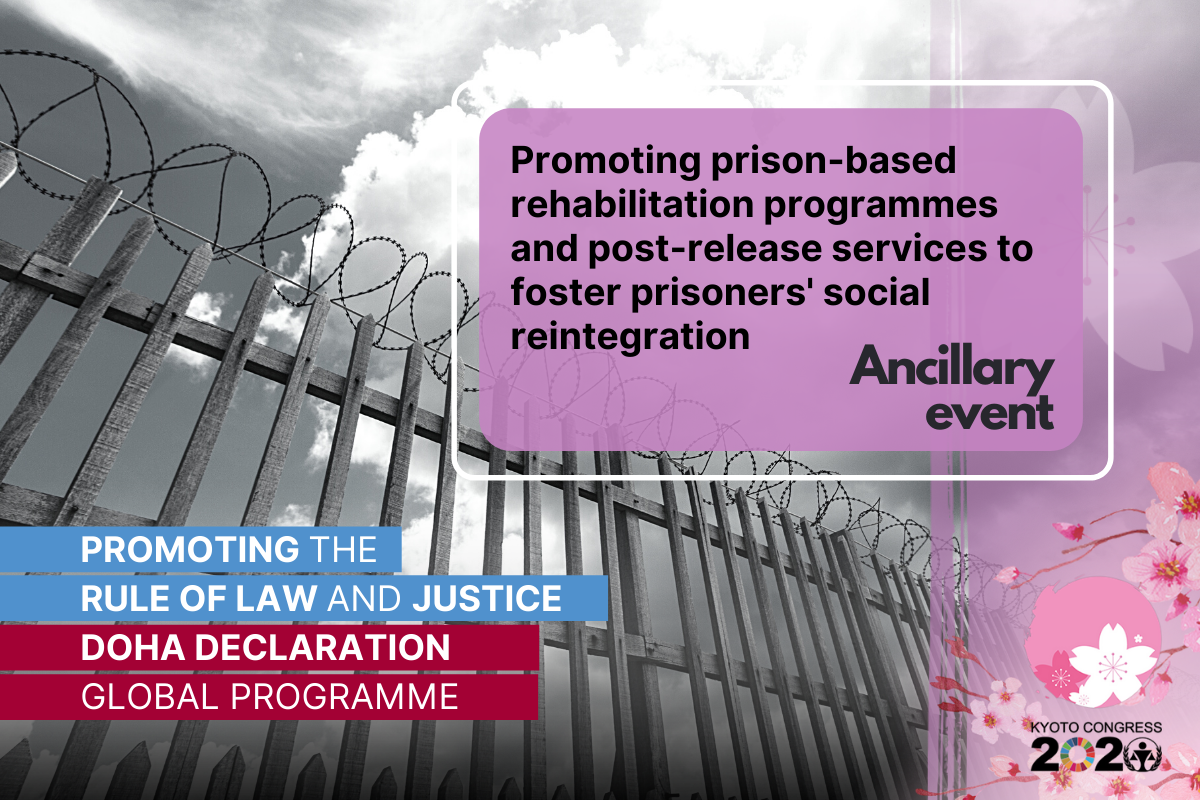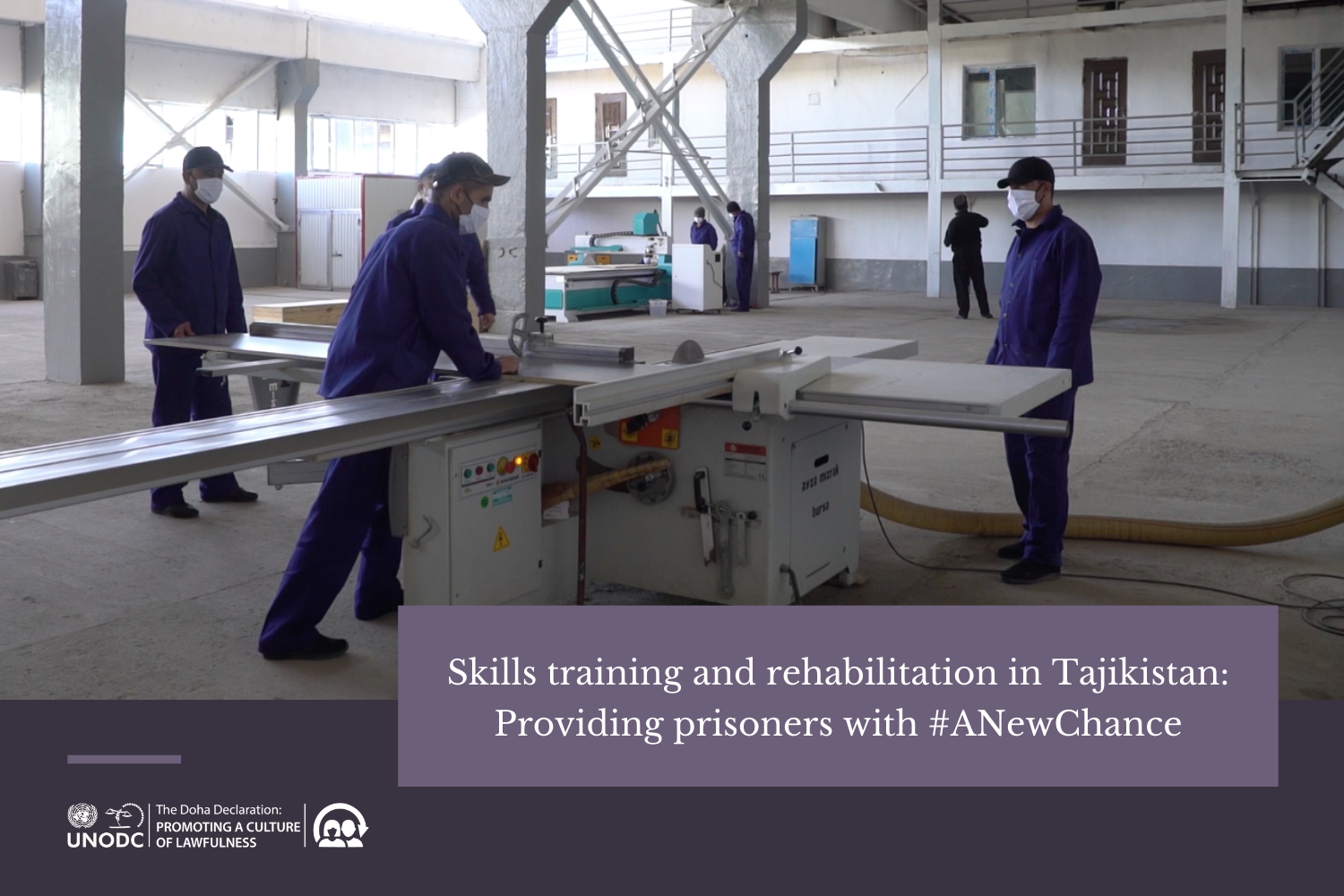Guidelines on creating a brand of prison products launched by UNODC this week
27 November 2019 - Penitentiary systems around the world are increasingly adopting prisoner rehabilitation initiatives as they attempt to reduce crime in their communities. Not only are rehabilitated prisoners less likely to reoffend, to fall back into criminal activities or to endanger society, but they also are more likely to become financially self-sufficient if they have been trained in a discipline or trade which they can continue to practice once liberated.
Various rehabilitation educational and vocational programmes are being applied in different prison systems, including some of those supported by UNODC such as electrical installations training in the State of Palestine, a bakery in Kyrgyzstan, or construction for female prisoners in Bolivia to name a few. In addition to these types of rehabilitative exercises, there are other common schemes in which prisoners are employed during their sentence, producing goods that are usable within the prison and also marketable outside. These work programmes have the additional benefit of generating income for prisoners (and consequently for their families), but another primary advantage is that it increases prisoners' qualifications, thus enhancing their employability upon release.
Moreover, when a prison successfully produces a branded product or a line of products, prisoners are known to enjoy improved self-esteem and self-confidence, which contributes to projecting a more positive image of rehabilitated prisoners within a society, and to reducing the stigmas which may float around them.
The exercise of product branding and all it entails is not generally something in the field of expertise of prison administration, but as the trend grows, some countries are beginning to indicate interest in the potential for creating brands as part of the rehabilitation process in their systems. To this end, in response to numerous requests from Member States, the Prisoner Rehabilitation component of UNODC's Global Programme for the Implementation of the Doha Declaration has launched this week its new Guide on Creating a Brand of Prison Products.
The technical guide aims at guiding Member States through the process of developing a brand of prison products or services, in line with applicable international standards on work programmes and work conditions for prisoners. It therefore includes specific and detailed reference to relevant international standards applicable, particularly the Nelson Mandela Rules (of which UNODC is the guardian) and the International Labour Organization Convention against Forced Labour.
These international standards specify that "prison labour must not be of an afflictive nature and not used for the personal benefit of civil servants"; they also stress that "prisoners shall not be held in slavery or servitude," and that "prisoners should receive an equitable remuneration for their work."
The Guide explores the pre-requirements that prison administrations should explore before creating their brand, such as assessing their compliance with international standards. It then explains the different steps prison administrations must take to develop a business model and, finally, the Guide explores the modality and the requirements to create a prison brand, and the commercialization of the branded products in the market.
 The launch coincided with a regional workshop in Doha on rehabilitation programmes in prisons, with the participation of a number of experts and prison administrators from the Middle East and North Africa region. Hosting this, the Director of Penal and Correctional Institutions of the State of Qatar, Brigadier-General Mohammed Saud Al-Otaibi, flagged the critical importance of understanding rehabilitation and its success for inmates from a business perspective, drawing on successes in his country. "Any approach to prisoner rehabilitation must be based on a firm, scientific understanding of the needs of the employment market for post-release success. Without this, the opportunities being provided to inmates will most certainly be undermined."
The launch coincided with a regional workshop in Doha on rehabilitation programmes in prisons, with the participation of a number of experts and prison administrators from the Middle East and North Africa region. Hosting this, the Director of Penal and Correctional Institutions of the State of Qatar, Brigadier-General Mohammed Saud Al-Otaibi, flagged the critical importance of understanding rehabilitation and its success for inmates from a business perspective, drawing on successes in his country. "Any approach to prisoner rehabilitation must be based on a firm, scientific understanding of the needs of the employment market for post-release success. Without this, the opportunities being provided to inmates will most certainly be undermined."
Indeed, at the presentation of the Guide, UNODC Crime Prevention and Criminal Justice Officer, Muriel Jourdan, noted that this provides exactly that, offering countries an extremely practical step-by-step to be use. "This Guide provides a one-stop location for this type of rehabilitation work offering countries an extremely practical step-by-step process they can use: it covers setting up a business plan; it looks at how to choose a logo; raises the question of how one builds a message. And all of this is within the specific context of prisons in order for administrations to learn from this for their countries."
This was echoed by the Doha Declaration's Global Programme Coordinator, Marco Teixeira: "While numerous prison administrations are committed to offering rehabilitation programmes to prisoners in their custody, they often face common obstacles when it comes to implementation, such as limited space, financial and human resources constraints as well as prison overcrowding. Many also face practical considerations including sustainable marketing and branding which, with the launch of UNODC's tool guide today, we hope to contribute towards alleviating."
The Guide on Creating a Brand of Prison Products is now available for download on the Global Programme's website.
Additional information:
Prisoner Rehabilitation


